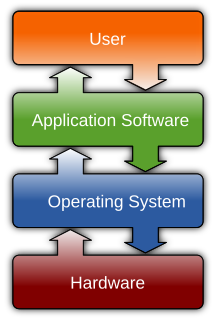
Software is a set of computer programs and associated documentation and data. This is in contrast to hardware, from which the system is built and which actually performs the work.

Free software or libre software, infrequently known as freedom-respecting software, is computer software distributed under terms that allow users to run the software for any purpose as well as to study, change, and distribute it and any adapted versions. Free software is a matter of liberty, not price; all users are legally free to do what they want with their copies of a free software regardless of how much is paid to obtain the program. Computer programs are deemed "free" if they give end-users ultimate control over the software and, subsequently, over their devices.
Program, programme, programmer, or programming may refer to:
Software engineering is a systematic engineering approach to software development.
Software testing is the act of examining the artifacts and the behavior of the software under test by validation and verification. Software testing can also provide an objective, independent view of the software to allow the business to appreciate and understand the risks of software implementation. Test techniques include, but not necessarily limited to:
Desktop publishing (DTP) is the creation of documents using page layout software on a personal ("desktop") computer. It was first used almost exclusively for print publications, but now it also assists in the creation of various forms of online content. Desktop publishing software can generate layouts and produce typographic-quality text and images comparable to traditional typography and printing. Desktop publishing is also the main reference for digital typography. This technology allows individuals, businesses, and other organizations to self-publish a wide variety of content, from menus to magazines to books, without the expense of commercial printing.
Development or developing may refer to:
Life cycle, life-cycle, or lifecycle may refer to:
Software design is the process by which an agent creates a specification of a software artifact intended to accomplish goals, using a set of primitive components and subject to constraints. Software design may refer to either "all the activity involved in conceptualizing, framing, implementing, commissioning, and ultimately modifying complex systems" or "the activity following requirements specification and before programming, as ... [in] a stylized software engineering process."
The Rational Unified Process (RUP) is an iterative software development process framework created by the Rational Software Corporation, a division of IBM since 2003. RUP is not a single concrete prescriptive process, but rather an adaptable process framework, intended to be tailored by the development organizations and software project teams that will select the elements of the process that are appropriate for their needs. RUP is a specific implementation of the Unified Process.
Test-driven development (TDD) is a software development process relying on software requirements being converted to test cases before software is fully developed, and tracking all software development by repeatedly testing the software against all test cases. This is as opposed to software being developed first and test cases created later.
An application program is a computer program designed to carry out a specific task other than one relating to the operation of the computer itself, typically to be used by end-users. Word processors, media players, and accounting software are examples. The collective noun "application software" refers to all applications collectively. The other principal classifications of software are system software, relating to the operation of the computer, and utility software ("utilities").
In software development, agile practices include requirements discovery and solutions improvement through the collaborative effort of self-organizing and cross-functional teams with their customer(s)/end user(s), adaptive planning, evolutionary development, early delivery, continual improvement, and flexible responses to changes in requirements, capacity, and understanding of the problems to be solved.

The V-model is a graphical representation of a systems development lifecycle. It is used to produce rigorous development lifecycle models and project management models. The V-model falls into three broad categories, the German V-Modell, a general testing model and the US government standard.
Software quality assurance (SQA) is a means and practice of monitoring all software engineering processes, methods, and work products to ensure compliance against defined standards. It may include ensuring conformance to standards or models, such as ISO/IEC 9126, SPICE or CMMI.
In software development, effort estimation is the process of predicting the most realistic amount of effort required to develop or maintain software based on incomplete, uncertain and noisy input. Effort estimates may be used as input to project plans, iteration plans, budgets, investment analyses, pricing processes and bidding rounds.
In software engineering, a software development process is a process of dividing software development work into smaller, parallel, or sequential steps or sub-processes to improve design, product management. It is also known as a software development life cycle (SDLC). The methodology may include the pre-definition of specific deliverables and artifacts that are created and completed by a project team to develop or maintain an application.
Application development may refer to:


